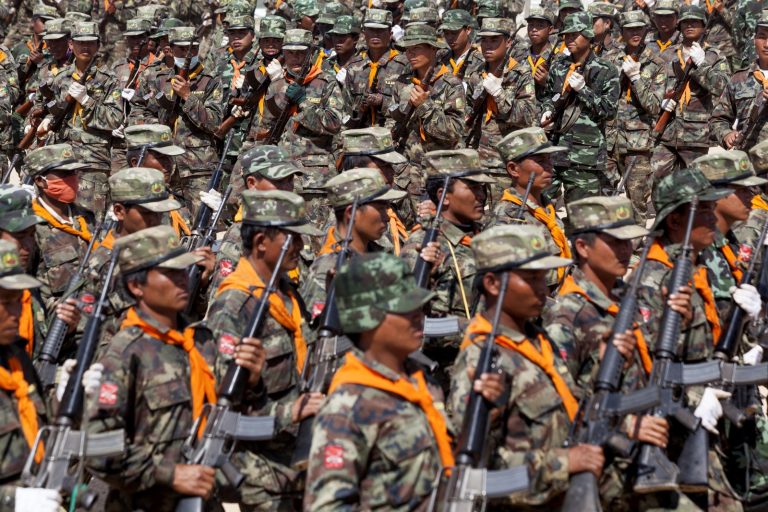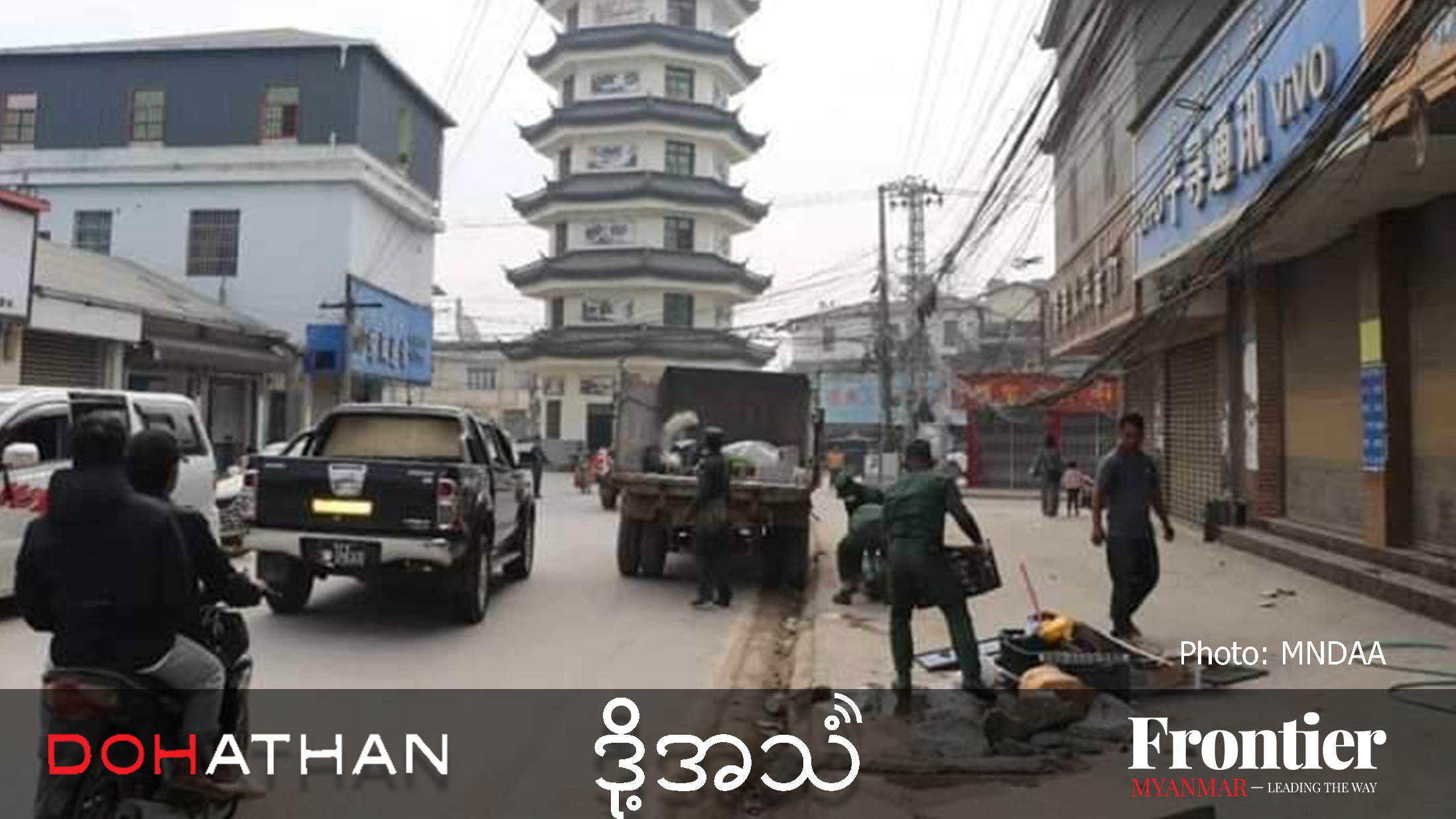Buddhism might be a religion of peace, harmony and compassion, but for the Venerable U Uttara, abbot of the Myanmar Europe Buddhist Missionary Center at Pale Myothit in Yangon’s Mingaladon Township, the past three decades have been filled with conflict and strife.

The Venerable U Uttara. (Hans Hulst / Frontier)
U Uttara ordained when he was 20. As a young monk he was appointed secretary of the Young Buddhist Monk’s Association and became involved in the nationwide protests that convulsed Myanmar in the summer of 1988. He led protests in the Shan State capital, Taunggyi.
The military junta did not forget or forgive and ordered his arrest a year later, prompting U Uttara to flee to Thailand. Four years later he found a new home in the Britain, where he became one of the few Theravada Buddhist monks who served as a chaplain, teaching mindfulness and offering spiritual advice to hospital patients.
In his spare time the monk-in-exile founded eight monasteries throughout Europe.
When Myanmar began opening after the change of government in 2011, U Uttara wrote to President U Thein Sein to propose a chaplaincy role for monks in the country’s prisons and hospitals. The President responded positively and U Uttara was invited to meet the deputy ministers of Religious Affairs and Health. He was asked to draft a proposal for the chaplaincy service and it was sent to the President’s Office and the two ministers. He never received a reply.
Support more independent journalism like this. Sign up to be a Frontier member.
After another short stint abroad U Uttara, who is popularly known as the London Sayadaw, returned to Myanmar and in 2014 became entangled in the highly publicised controversy over the ownership of the Mahasantisukha Monastery in Yangon’s Tarmwe Township. U Uttara was one of five monks taken from the monastery, held in a police cell, disrobed, detained briefly in Insein prison and charged with insubordination of Myanmar’s supreme Buddhist ecclesiastical body, the government-sponsored State Sangha Maha Nayaka Committee, and defaming religion. The court case against the Mahasantisukha 5 continues.
Asked by Frontier about the origins of the Mahasantisukha dispute, U Uttara said the monastery was founded in 1995 by his teacher, the Venerable U Pannavamsa, who is also known as the Penang Sayadaw.
“He went abroad to Malaysia, to build monasteries and spread the Buddhist teachings,” U Uttara said. “When he was away the problems started. Former general U Saw Myint became chairman of the board of trustees and U Pannavamsa wanted him removed because he felt the chairman had mishandled money. But U Saw Myint went to [Military Intelligence chief] Lieutenant-General Khin Nyunt and said that the abbot did not like the government and that he was organising monks politically. Then Khin Nyunt took over the monastery and tried to give it to the state-sponsored Sangha Maha Nayaka council.”
But it did not initially accept the ‘gift’?
Right, because they felt the monastery belonged to its founder, U Pannavamsa. Khin Nyunt then asked them to look after it, until the abbot would return. This was in harmony with the Buddhist way, although my teacher was very upset. Just before Khin Nyunt was put under house arrest in 2004, he wrote a letter to U Pannavamsa asking him to come back and to return to his monastery.
What happened when U Pannavamsa returned nearly 10 years later?
A close friend of the abbot, U Rajadhamma, was celebrating his 80th birthday in 2013. U Pannavamsa attended the celebration and wanted to stay at Mahasantisukha Monastery during his visit. He came back and found it to be in terrible shape. The government had dishonoured the monastery. They organised aerobic lessons there. It was like a nightclub!
The donors were sad about this. They had donated money to the monastery for it to become a Buddhist training centre. Now they asked U Pannavamsa to stay and manage the monastery again. The abbot sent a letter to the State Sangha council, thanking them for taking care of the monastery, and if he could please be in charge again. They flatly refused. It was theirs now, they said, even though U Pannavamsa had proof of ownership documents and the letters of Khin Nyunt. The council said: Just go away!
U Pannavamsa aired his grievances during a press conference and sent a letter to U Thein Sein, asking him to mediate. So the President approached the council, saying he did not like to see religious problems. They didn’t listen and even threatened the President that they would punish him if he interfered.”
In June 2014, you were arrested after U Pannavamsa left for a visit to Japan. Why were you detained?
They turned up [at the monastery] with about 400 people: police, monks, Swan Arr Shin plainclothes thugs, and officials from the Ministry of Religious Affairs. In total they arrested 22 people, including me. They said I was trespassing. We were in a police cell for three days. On June 12 they disrobed me and four other monks. After that we were sent to Insein prison for a week. They didn’t let us talk to a solicitor, but as I hold a British passport the embassy came to visit me. On June 20 we were taken to court and paid bail: 200,000 kyat each.
What has happened since then?
The monastery has been closed on orders of the Ministry of Religious Affairs. They will only reopen after the court has ruled in the matter. Well, a year later the court case is still dragging on. Every two weeks we have to go to court. But nothing much happens. I think this is the first time Buddhist monks are going to court in Myanmar. It is unique! The first judge was rather scared, so he was replaced by Tarmwe Township Court judge U Tin Tun Oo. He’s less afraid to handle this case.
The Myanmar Times reported that he would pass judgement on August 21 but it didn’t happen. When will this end?
I have no idea. Maybe they are stalling.
Meanwhile, the ultra nationalist monks of the Association to Protect Race and Religion, known as Ma Ba Tha, drafted a controversial set of laws that have been approved by parliament. Do you feel that in principle monks can be politically active?
We are not politicians, we are monks. The Buddhist philosophy aims to create peace and harmony between people. Politics is like business. People horse trade and argue in politics. It is not peaceful. Pongyis [monks] can mediate in the interest of everybody involved, but they should stay away from party politics. I believe politics should be secular and kept separate from religion.
Monks can’t vote and we shouldn’t try to influence the vote. The leader of Ma Ba Tha is a friend of mine. I respect him, but our ideas differ. What I recently said to him is: Everybody lives under the constitution, and the fight for a just constitution was lost in 2008. People should bear in mind how they can use their vote to have the constitution changed. The constitution is the most important thing.
Research released recently by Asia Barometer found that 69 percent of voters consult monks about political affairs. Do you think Ma Ba Tha will influence the election outcome?
Ma Ba Tha think they’re strong, but the people know they do things that are wrong and that they are pro-government. Their support is weakening. For every Ma Ba Tha monk there is a monk who is pro-democracy. I say to voters: After fifty years of military rule and poverty you know who to choose. Be clever and take an interest in politics. It doesn’t do to blame Karma. It’s politics and the system that can make you poor, not Karma.”
Is the government doing enough to stem Buddhist nationalism?
Politicians use religion for their own benefit. They say: This is our own Buddhist country. The Myanmar people are told they should fear Muslim expansion, that they risk losing everything. So it is not hatred but fear. Politicians are using this fear. I think Buddhist monks should teach people how to live together in harmony with others. We shouldn’t try to control who they fall in love with or for whom they vote.
A prominent member of Ma Ba Tha, U Wirathu, seems to be especially vitriolic in his comments. Where does his hate come from?
I know U Wirathu well. We were taught in the same monastery, although I am ten years older than he is. Since the court case I haven’t spoken with him. My followers abroad warned me not to pose for pictures with him. You never know how they will be used when they end up on Facebook.
I think U Wirathu started to hate when his monastery in Kyaukse, the birthplace of Senior General Than Shwe, was torched by a Muslim. That was the germ of it. Hate has spread throughout his brain. He was arrested in 2003 and released in 2010. It seems government has an agenda. U Wirathu might be just a tool to them.
Are economic and political reforms as well as increased foreign aid and investment doing enough to end poverty, and ultimately, religious strife in Myanmar?
All suffering in Myanmar is man made. What we need is a mind change. If we don’t change the way we think, the suffering in this country will never end.






